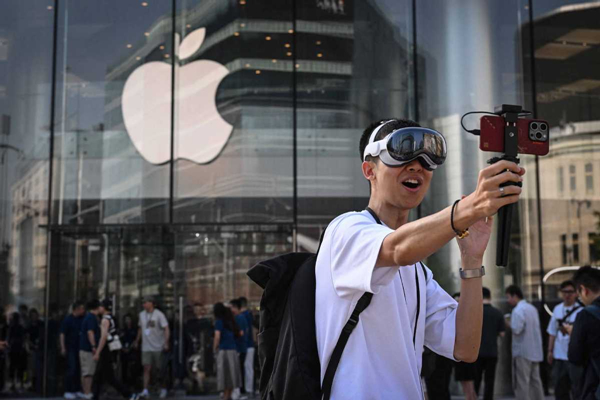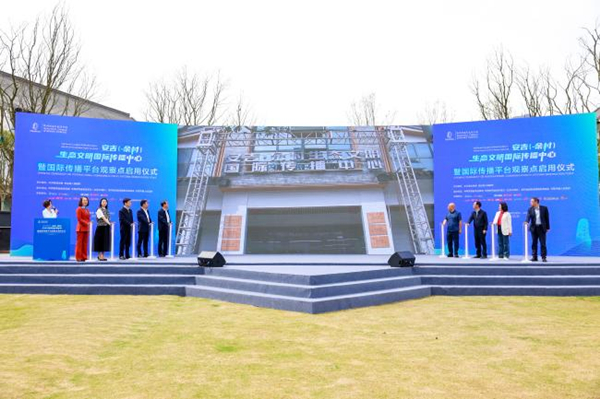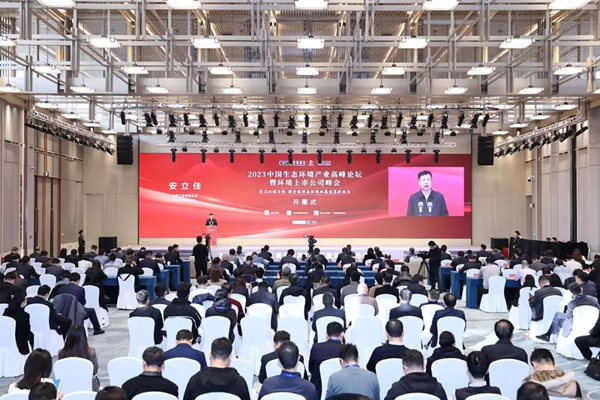AR glasses give enhanced sector clarity

A man wearing an Apple Vision Pro headset records footage in front of an Apple Store during the launch of the mixed-reality headset in Beijing in June. [Photo/Agencies]
Wang Liming, a software engineer in Beijing, decided to buy Apple's augmented reality glasses after trying them on in an offline experience store.
"Despite the high price tag of 29,999 yuan ($4,128), I did not hesitate. It is no longer just a gaming device. It can really help me work better by providing an infinite 3D virtual canvas for various apps," Wang said.
Wang is not alone. After Apple officially kicked off sales of its Vision Pro in China on June 28, more Chinese consumers are willing to try such new cutting-edge gadgets, and more domestic companies are eager to expand their presence in the market, experts and company executives said.
China's augmented reality industry is expected to usher in a new stage of growth, as Vision Pro's official release in China is expected to encourage more local software developers to come up with more innovative applications for it, said Zhao Siquan, a senior analyst at market research company International Data Corp's China branch.
For instance, Chinese internet companies including Alibaba, Tencent, ByteDance and Sina launched new apps for Vision Pro, such as Douyin VR Live, Taobao and Tencent Video.
Chinese e-commerce giant JD also said it has launched JD.Vision, a native Apple Vision Pro app that offers an immersive shopping experience. JD.Vision delivers an experience that closely mirrors in-store visits and transcends the limitations of traditional shopping, the company said.
Consumers can virtually "place "products in their homes, visualizing real-time dimensions, texture and design compatibility with accuracy and ease. This immersive approach addresses common online shopping challenges by eliminating the need for frequent trips back and forth to brick-and-mortar retailers and overreliance on 2D images and text descriptions. Instead, shoppers can enjoy a reliable and realistic experience where "what you see is what you get", JD added.
Meanwhile, with continuous advancements in AR displays and optical solutions, processors and wireless connectivity technology with other devices such as smartphones and computers — as well as improvements in user interfaces and applications — the Chinese AR smart glasses market is expected to experience further growth, experts said.
Shipments of China's AR smart glasses jumped over 150 percent year-on-year in 2023 to 262,000 units, IDC said.
It is expected that in 2024, more AR smart glasses will be commercialized, bringing richer experiences to outdoor applications and life assistance scenarios, another market research company Counterpoint said.
But Donghai Securities said in a report that the relatively high price tag of Apple's Vision Pro ensures its initial user base will primarily consist of enthusiasts and app developers, rather than the general public.
The strategic intent behind this pricing is to establish a benchmark for AR hardware and software, thereby attracting developers to the Apple ecosystem and nurturing the visionOS software environment. As the ecosystem matures, Apple plans to introduce a more affordable second-generation product to appeal to a broader consumer market, Donghai Securities added.
Ye Qingqing, an IDC China analyst, said: "This year, Vision Pro's primary market focus in China will be on the mid-to-high-end business market, targeting enterprises and organizations. Sales in the consumer segment (targeting individual users) are expected to decline after the initial surge. While significant growth in volume is unlikely this year, the product will spur competition among AR market players."
Zhongyuan Securities also said in a report that consumer interest spurred by Apple's entry into the AR market will benefit existing manufacturers offering competitively priced headsets. Enthusiasts deterred by Vision Pro's price tag are likely to opt for these alternatives, thus driving the global AR market forward.
Eyeing future growth potential, a string of foreign and Chinese companies offer virtual reality or AR headsets. Apple's competitors include US company Meta, whose popular Quest 2 headset is priced at just $500. Meanwhile, Chinese companies such as Huawei, Oppo, Pico and HTC have also been actively launching AR glasses and VR headsets.
Chinese AR startup Xreal, for instance, recently also unveiled a phone-like device for its AR glasses, as it works hard to enrich AR content to attract more people to try out cutting-edge devices for themselves.
The company's latest product, the Xreal Beam Pro, can support most mobile apps displayed in its smart glasses. It comes with 3D cameras that can help shoot 3D content, aiming to solve the biggest bottleneck for the development of the AR industry.
Xu Chi, founder and CEO of Xreal, which is backed by big-name investors such as Alibaba Group Holding Ltd and Hillhouse Capital, said the AR sector has yet to experience its "iPhone moment", which refers to a tipping point leading to explosive growth.
Xu said the industry is currently converging around three main product types.
The first type is immersive devices, such as relatively bulky headsets like Meta's Quest and Apple's Vision Pro.
The second type includes lightweight, all-day wearable devices like AR glasses.
Lastly, the third type aims to bridge the gap between the above two categories, such as what the Xreal Beam Pro does.
Rokid, another Chinese AR glasses maker, has also unveiled its latest product — Rokid AR Lite — as it aims to accelerate the popularity of special computing with more affordable devices.
In stark contrast to the high-cost offerings dominating the market, the company said the Rokid AR Lite stands out as a device that prioritizes accessibility without compromising on quality.
The Rokid AR Lite was launched on Kickstarter, a crowd-funding platform for innovative products, for $749. However, early backers can acquire the device for $499, enjoying a discount of up to 30 percent, Rokid said.
Misa Zhu, founder of Rokid, said the new product marks a significant turning point in the widespread adoption of AR technology, and the company hopes to make AR accessible to a broader audience.
The Hangzhou, Zhejiang province-based company said that by seamlessly integrating the advanced features of the Rokid Max 2 glasses with the powerful capabilities of the Rokid Station 2 host unit, Rokid has crafted a product that revolutionizes the industry by making immersive spatial computing accessible to all.
HTC Corp, a virtual reality pioneer, is also teaming up with partners to leverage cutting-edge digital technologies to create new cultural experiences. It launched an immersive exhibition — Horizon of Khufu — in Beijing, based on the recreation of the interior and surroundings of the Pyramid of Khufu in Egypt.
In the Horizon of Khufu digital immersion exhibition, viewers wear HTC's Vive Focus 3 headsets. In addition to gaining a close understanding of the internal structure and historical context of the pyramid, they will also be able to explore areas that have never been open to the public before, and even travel as far as 4,500 years into the past to uncover the mystery of ancient Egyptian civilization, the company said.
Charles Huang, global senior vice-president of HTC Vive, said combining technology with culture has always been HTC VIVE's vision. "We also always uphold the concept of openness and inclusiveness, and want to continuously break down barriers between the virtual and real world, and refresh people's experiences of exploring the world."





